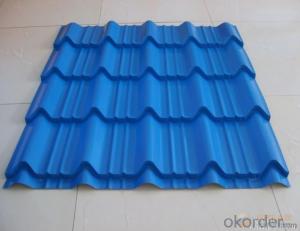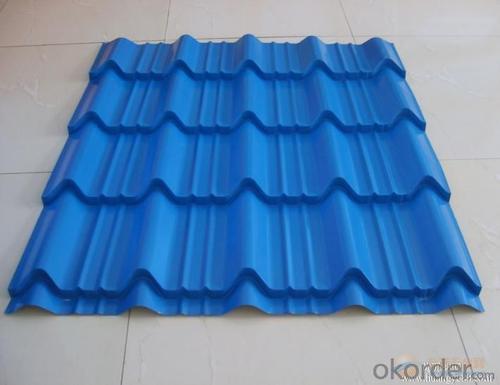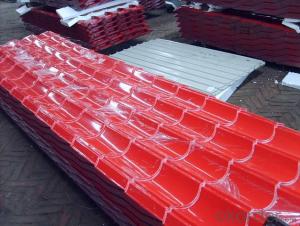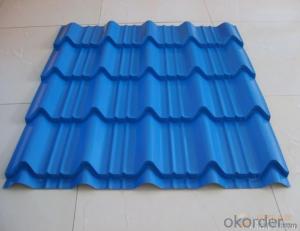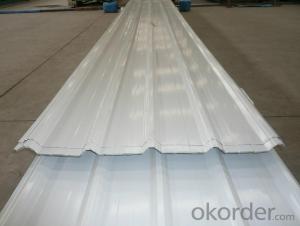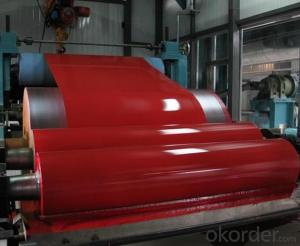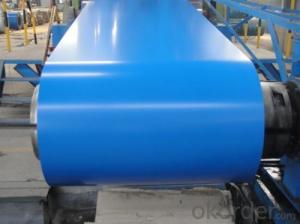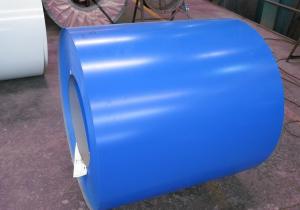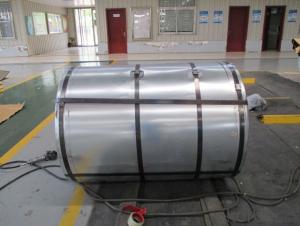High Quality of Prepainted Corrugated Steel Sheet from China
- Loading Port:
- Tianjin
- Payment Terms:
- TT OR LC
- Min Order Qty:
- 50 m.t.
- Supply Capability:
- 100000 m.t./month
OKorder Service Pledge
OKorder Financial Service
You Might Also Like
1. Pre-Painted Galvanized/Aluzinc Steel Roof Description:
With GI as base material, after pretreatment (degrease and chemical treatment ) and liquid dope with several layers of color, then after firing and cooling, finally the plate steel is called pre-painted galvanized (aluzinc) steel. Pre-painted galvanized roof is good capable of decoration, molding, corrosion resistance. It generally displays superior workability, durability and weather resistance.
2.Main Features of the Pre-Painted Galvanized/Aluzinc Steel Roof:
• Excellent process capability
• Smooth and flat surface
• Workability, durability
• Excellent heat resistance performance
• High strength
• Good formability
• Good visual effect
3.Pre-Painted Galvanized/Aluzinc Steel Roof Images
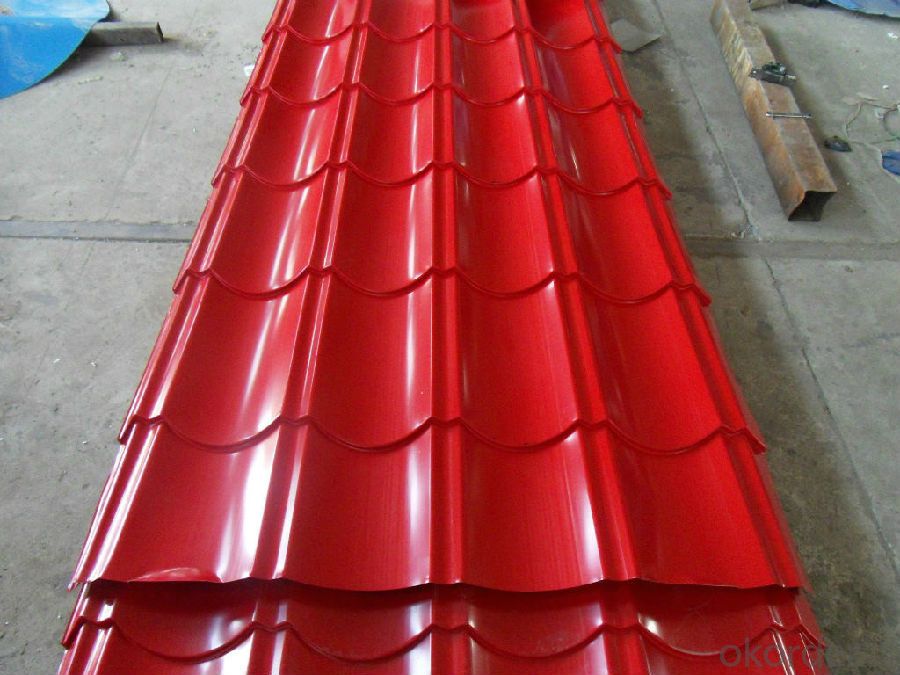
4.Pre-Painted Galvanized/Aluzinc Steel Roof Specification
Standard: AISI, ASTM, BS, DIN, GB, JIS
Grade: SGCC SGCH SGCD DX51D
Thickness: 0.13-3.0mm
Model Number: AISI, ASTM, BS, DIN, GB, JIS
Type: Steel Plate
Technique: Cold Rolled
Surface Treatment: Galvanized
Application: Container Plate
Special Use: High-strength Steel Plate
Width: 30-1500mm
Length: any length
color: RAL color
5.FAQ of Pre-Painted Galvanized/Aluzinc Steel Roof
What’s the brand of the paint?
We use the best brand of all of the word—AKZO.
What’s the wet and heat resistance of the roof?
More than 1000 hours.
- Q: What is the shear modulus of steel and silver? Please help! and state where you got it from...what site did you used? Thanks.
- This Site Might Help You. RE: What is the Shear Modulus of Steel and Silver? What is the shear modulus of steel and silver? Please help! and state where you got it from...what site did you used? Thanks.
- Q: How do steel coils contribute to the manufacturing of agricultural machinery?
- The manufacturing of agricultural machinery heavily relies on steel coils, which play a vital role in this process. Typically, these coils are crafted from top-notch steel that possesses exceptional strength, durability, and resistance to corrosion. To begin with, agricultural machinery heavily relies on steel coils for the construction of its main structural components, including the chassis, frames, and supports. These components must endure heavy loads, extreme weather conditions, and rough terrains. Thanks to the strength and resilience of steel coils, the machinery can effectively handle these challenging environments and operate efficiently. In addition, steel coils find application in the production of various moving parts and mechanisms within agricultural machinery. For example, gears, shafts, and axles, which are crucial for power transmission and rotational motion transformation, are created using steel coils. The high tensile strength and excellent machinability of steel make it an ideal material for these essential components, ensuring their reliability and longevity. Moreover, steel coils contribute to the manufacturing of agricultural machinery by providing a protective layer against wear and tear. Often, these coils are coated with specialized finishes or paints to enhance their resistance to rust, chemicals, and abrasion. This protective layer significantly prolongs the machinery's lifespan, reduces the need for frequent maintenance and repairs, and ultimately increases its overall efficiency and productivity. Furthermore, the versatility of steel coils allows for customization and adaptation to meet the specific requirements of agricultural machinery. Manufacturers can shape and mold the coils into different sizes and dimensions, enabling the production of machinery suitable for various farming practices and applications. Whether it's tractors, harvesters, or irrigation systems, steel coils are crucial for creating versatile and dependable agricultural machinery. In conclusion, steel coils are essential in the manufacturing of agricultural machinery due to their strength, durability, resistance to corrosion, and customization capabilities. From structural components to moving parts and protective coatings, steel coils greatly contribute to the efficiency, reliability, and longevity of agricultural machinery, thus providing significant support to the global agricultural industry.
- Q: What is the standard width of steel coils?
- The standard width of steel coils can vary depending on the specific industry and application. However, in general, the standard width for steel coils ranges between 36 inches to 72 inches. The specific width will depend on factors such as the type of steel being used, the intended use of the coils, and the equipment used for processing and handling the coils. It is important to consult industry standards and specifications to determine the appropriate width for a particular steel coil application.
- Q: why does steel have a density range when other metals do not?
- Steel is not a pure element it is an alloy. Steel is primarily iron but it has many elements blended in that change it's density including carbon,silicon, nickel, chrome, etc. Aluminum and copper , magnesium and so forth can be the pure element or they can be alloys too. If they are alloys, then their densities vary also
- Q: I want to experiment with making steel and want to especially make it stronger. And also I want to know if its possible to turn a meteorite into steel?
- To add to Alex's good answer... ASM Intl now has a book titled Steel Metallurgy for Non-Metallurgist. You can turn metallic meteorites into steel if you add the right amount of Fe and C. That won't make it the strongest but it is possible. I don't think you want the strongest exactly. In general and with swords in particular, you want to be pretty specific about exactly what physical properties you want. Strength and ductility typically vary inversely to each other, higher stength, lower ductility, or lower strength, higher ductility. The issue is related to the idea of a diamond sword. It would be nice and hard but it would probably shatter the first time you stuck anything with it. Swords need a combination of properties, hard so it holds a sharp edge, and tough so it does not fracture, strong so it can be light enough to swing.
- Q: How are steel coils used in the manufacturing of agricultural sprayers?
- Steel coils are used in the manufacturing of agricultural sprayers as they are shaped and formed into the structure of the sprayer, providing strength, durability, and stability. The coils are often used as the main frame or structural components of the sprayers, ensuring that they can withstand the harsh conditions and heavy loads involved in agricultural applications.
- Q: What are the different methods of welding steel coils?
- Steel coils can be welded using various methods, each with its own advantages and applications. The most commonly used methods for welding steel coils are: 1. Resistance Welding: By applying pressure and electric current, this method generates heat and joins the steel coils. It is ideal for high-speed production and can be categorized into spot welding, seam welding, and projection welding. 2. Arc Welding: This technique involves creating an electric arc between an electrode and the steel coils, resulting in intense heat and metal melting. Different arc welding techniques include shielded metal arc welding (SMAW), gas metal arc welding (GMAW), and flux-cored arc welding (FCAW). 3. Laser Welding: Laser welding employs a highly focused laser beam to melt and join the steel coils precisely. It offers excellent control, high welding speeds, and minimal heat-affected zones, making it suitable for thin materials and complex designs. 4. Electron Beam Welding: This method uses a concentrated beam of high-velocity electrons to melt and fuse the steel coils. It is commonly used for welding stainless steel and other high-temperature alloys, providing deep penetration and minimal distortion. 5. Friction Stir Welding: By plunging a rotating tool with a pin into the steel coils, heat is generated through friction, and the softened material is stirred together to form a solid joint. Although primarily used for joining aluminum, it can also be applied to steel coils. 6. Ultrasonic Welding: This technique involves applying high-frequency vibrations to the steel coils, creating friction and heat for fusing the materials. It is commonly used for smaller steel coils and provides fast and efficient welding with minimal distortion. These methods offer distinct advantages and are suitable for specific applications. The choice of welding method depends on factors such as the type and thickness of the steel, desired strength and quality of the weld, production speed, and cost considerations.
- Q: What materials are used to make steel coils?
- Steel coils consist primarily of steel, an alloy primarily composed of iron and carbon. The choice of steel type for coil production depends on the desired properties and applications. Carbon steel is typically the preferred option due to its strength, durability, and versatility. Additional alloying elements, like manganese, silicon, nickel, or chromium, may be incorporated to enhance specific steel characteristics or properties. To produce steel coils, the raw materials are melted, the molten steel is refined, and specialized equipment and processes are employed to shape it into coils.
- Q: I have a set of Stainless steel pots and pans. Everything is sticks to them. What must I do so things don't stick?
- a good de-greasing cleansing soap, a pad of metal wool, some warm water, and elbow grease will do the interest. Or once you've really one of those steamer gadgets, it truly is going to fantastically a lot melt off. And when you've them wiped clean up, somewhat Bon Ami and a scouring pad used each now and then will stay away from the upward thrust from returning. yet another good product is Twenty Mule team Borax oftentimes discovered close to the laundry products.
- Q: In terms of weight to strength titanium is stronger. But is it stronger than mild steel? If it is stronger, how much stronger is it?
- Contrary to what we are usually told, Ti weight to strength ratio is better only for lower strength alloys. Steels match or best Ti and Al alloy ratio's for high strengths. Hard to answer this question, due to varying effects of cold work, alloying, and heat treatments. In general, traditional mild steels with little cold work are about equivalent strength to commercially pure Ti. Cleverly selected mild steels with extensive cold work have greater UTS (and really greater SMYS) than commercially pure Ti, and approach strength of the best Ti alloys. Ti starts at about 60ksi UTS for commercially pure, and goes up to about 200ksi for high strength alloys. Mild steel has varying definitions. Plain carbon steels use virtually no alloying materials other than carbon. Low carbon steels starting in the 1008 (0.08% carbon) range can be cold worked to 100ksi UTS, while 1030, the maximum carbon for mild steel per one source, can be cold worked up to about 180ksi. Simple steels can go about 215 ksi UTS at fairly reasonable cost with lesser cold work than I was using because producers can't make stronger steels with higher degrees of cold work. High strength alloys can best 350ksi at impressively high cost. (and they match best titanium alloy strength to weight ratio). They are why wide body aircraft have lots of steel - landing gears, flap mechanisms, etc. Don't know about cold working Ti though. It doesn't seem to be done much, but difficult to find info.
Send your message to us
High Quality of Prepainted Corrugated Steel Sheet from China
- Loading Port:
- Tianjin
- Payment Terms:
- TT OR LC
- Min Order Qty:
- 50 m.t.
- Supply Capability:
- 100000 m.t./month
OKorder Service Pledge
OKorder Financial Service
Similar products
Hot products
Hot Searches
Related keywords
